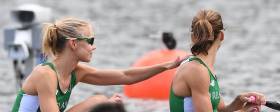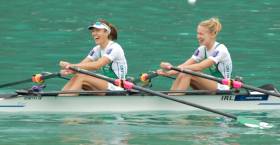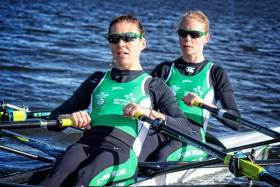Displaying items by tag: Sinead Lynch
Irish Women Sixth in Olympic Rowing Final
#Rowing: Sinead Lynch and Claire Lambe finished sixth in the Olympic final of the lightweight double sculls in Rio de Janeiro.
The Ireland crew needed to be strong in the middle 1,000 metres, but the race got beyond them, and they could not hold on to the leaders. The Netherlands won gold. They started well and were in the leading group of three with South Africa and the China. As they other two faded, the Netherlands pushed on and held off a challenge by Canada, who took silver, with China third.
Olympic Games Regatta, Rio de Janeiro
Men
Lightweight Double Sculls: B Final (places 7 to 12): 1 Britain (W Fletcher, R Chambers) 6:28.81.
Single Sculls - Semi-Final (Three to A Final; rest to B Final):
4 Britain (A Campbell) 7:09.54.
Women
Lightweight Double Sculls - A Final:
Netherlands 7:04.73, 2 Canada 7:05.88, 3 China 7:06.49; 6 Ireland (C Lambe, S Lynch) 7:13.09.
Lynch and Lambe Cruise to Olympic Semi-Finals
#Rowing: Ireland's Sinead Lynch and Claire Lambe have qualified for the A/B Semi-Finals of the lightweight double sculls at the Olympic Games. The Ireland crew finished a comfortable second behind South Africa, the second seeds, who led down the course. Cuba and Brazil were the only threats to Lynch and Lambe, but were well behind at the end.
Britain's Kat Copeland and Charlotte Taylor finished fifth in the first heat.
Olympic Games Regatta, Rio de Janeiro (Irish interest; selected results)
Women
Lightweight Double Sculls - Heats (First Two to A/B Semi-Finals; rest to repechages): Heat One: 1 China 7:00.13, 2 Denmark 7:01.84. Heat Two: 1 Netherlands 6:57.28, 2 New Zealand 7:02.01.
Heat Three: 1 South Africa 7:07.37, 2 Ireland (C Lambe, S Lynch) 7:10.91; 3 Brazil 7:20.79, 4 Cuba 7:26.43, 5 Tunisia 7:43.33.
Heat Four: 1 Canada 7:03.51, 2 Poland 7:05.02
Driven Irish Win B Final in Lucerne
#Rowing: Ireland’s lightweight women’s double won the B Final emphatically at the World Cup Regatta in Lucerne this morning, placing seventh at this prestigious regatta. The crew of Sinéad Lynch (née Jennings) and Claire Lambe had come very close to taking an A Final place. They dominated this B Final. The race was quite close early on, but Ireland took control before half way and carved out a clear water lead. Poland were second and Britain third.
World Cup Regatta, Lucerne, Switzerland (Irish interest; selected results)
Men
Lightweight Pair – A Final: 1 Britain (J Cassells, S Scrimgeour) 6:31.03.
Women
Lightweight Double Sculls – B Final (Places 7 to 12): 1 Ireland (C Lambe, S Lynch) 7:01.36, 2 Poland 7:03.01, 3 Britain 7:04.88.
Lynch and Lambe Denied A Final Place by Half a Second
#Rowing: Ireland’s Sinead Lynch and Claire Lambe just missed out on an A Final place at the World Cup Regatta in Lucerne today. The lightweight double semi-final was a good race – only Canada looked certain of a top three spot going into the final sprint and they won. Denmark finished well and took second, with China Two just taking the crucial third spot ahead of Ireland. The margin was just .43 of a second.
World Cup Regatta, Lucerne, Switzerland (Irish interest, selected results)
Women
Lightweight Double Sculls – Semi-Finals (Three to A Final; rest to B Final) – Semi-Final One: 1 New Zealand 7:01.10, 2 South Africa 7:01.16, China One 7:03.37.
Semi-Final Two: 1 Canada (L Jennerich, P Obee) 6:58.88, 2 Denmark 7:00.91, 3 2 China Two 7:01.80; 4 Ireland (C Lambe, S Lynch) 7:02.23.































































